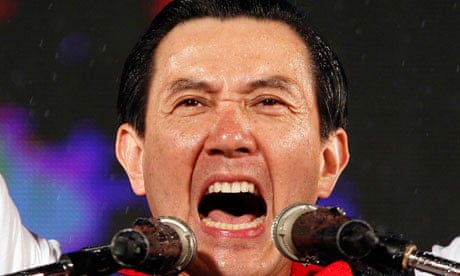Taiwan's incumbent president, Ma Ying-jeou, who has overseen an unprecedented thaw in relations with China, has been re-elected decisively after a tight race.
Analysts had said the contest was too close to call as it reached its closing stages, with the Democratic Progressive party (DPP) candidate, Tsai Ing-wen, mounting an unexpectedly strong challenge.
But with almost all ballots counted, the central election commission said Ma held 51.5% of the vote to his rival's 45.7%.
"This is not my personal victory. This victory belongs to Taiwanese people," the 61-year-old told thousands of Kuomintang (KMT) supporters who had gathered outside his Taipei headquarters despite the pouring rain. They sounded klaxons and waved flags in celebration.
Tsai, 55, was widely praised for a savvy campaign, but announced that she was standing down as she conceded defeat.
"We are sorry to let you down. Our efforts were not enough," said the island's first female presidential candidate.
The result was a relief for Beijing, which still hopes for reunification with the self-ruled island and viewed the re-emergence of the pro-independence DPP with alarm. The election was also watched closely in Washington, amid concerns that a Tsai victory could lead to instability in relations with China.
"You can only interpret this as an unequivocal mandate … The KMT must be delighted," said Jonathan Sullivan, an expert on Taiwan at the University of Nottingham.
"Given that there was a lot of dissatisfaction with Ma's performance, and Tsai mobilised that extremely well, this was the DPP's opportunity. Ma was very clear about what he was offering [in terms of closer ties to the mainland] and if people didn't want that they had an opportunity to say so."
While Ma did even better in 2008 – beating the DPP's Frank Hsieh by 58% to 42% – Sullivan said that had reflected the DPP's deep unpopularity at the time.
The third candidate this time around, James Soong – who some had thought could claim a sizable chunk of Ma's supporters – had just 2.8% of the vote.
Analysts said the simultaneous elections for the legislature seemed on course to bring a reduced but still comfortable majority for Ma.
The KMT campaign suggested voters faced a choice between the benefits of the closer economic ties Ma has forged and uncertainty under Tsai. Meanwhile, the DPP's campaign accused Ma of failing ordinary voters and pledged to tackle inequality and improve the lives of workers. Tsai toned down her party's stance on cross-straits relations.
"Voters used their ballots to support us because we were on the right track to push for a peaceful cross-strait relationship and to gain diplomatic space," said the mayor of Taipei, Hau Long-bin, a KMT member.
Turnout is thought to have reached around 74% of the 18 million Taiwanese eligible to vote. It was only the fifth direct presidential election in the young democracy.
